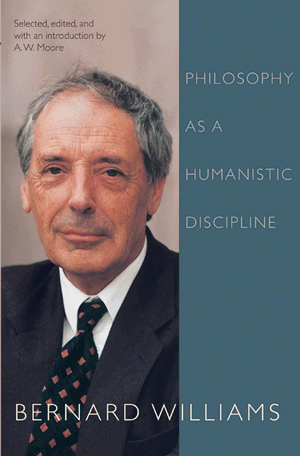Book Review: Bernard Williams’s “Philosophy as a Humanistic Discipline”
by Miles Raymer
I almost quit reading this book after the first few chapters. Bernard Williams’ opaque arguments about metaphysics and epistemology––hardly my favorite philosophy subjects––are enervating to the point of somnolence. I’ve never enjoyed or been particularly enlightened by analytical philosophy, which typically deploys the tropes of formal logic to imbue philosophical arguments with an air of mathematical authority and objectivity. It’s a method I find intellectually inaccessible and at least somewhat disingenuous. Part of philosophy’s difficulty and appeal is that its core concepts elude hard and fast definitions, thereby allowing for potential gaps in any view that purports a comprehensive perspective. Philosophy that relies on the rigid structures of formal logic is redolent of the overarching systematicity philosophers often try to get at but never actually achieve. I’m always left wondering what premises are being misconstrued or left out entirely in analytic discourse, and also if everyone would agree that yes, such conclusions do incontestably follow from them.
I’ll confess that the analytic method bothers me for another reason, which is that it lays bare my intellectual limitations. Beyond the simplest syllogisms, I find it nearly impossible to follow formal logic, and often feel it proves nothing more than the illusory character of the clarity at which it grasps. I could perhaps demystify such arguments if I dedicated more time and focus to them, but I’m the first to admit that I find it utterly intolerable to do so; the result is the same as if they were altogether beyond the capacity of my neural bandwidth. I won’t concede, however, that my dissatisfaction is fully circumscribed by my personal predilections. There are good reasons that the halcyon days of analytic philosophy are in the past, and many minds superior to mine have encouraged philosophers to dispense with the pretense of formal logic in favor of a more vernacular style.
Fortunately, that is precisely the manner in which this collection of essays progresses. The first half is riddled with perplexing confabulations of conceptual analysis, pointless tangents about subjective semantics, and insular academic squabbles. Halfway through the book, however, I found myself suddenly awash in cogent, nuanced prose swelling with insights about politics and ethics. Gone were the awkward lists of premises and variable-sprinkled paragraphs, making way for much more palatable––and therefore more enlightening––thoughts. Since the book’s latter essays were written more recently than the opening ones, it seems fair to conclude that Williams may have matured as both a philosopher and communicator toward the end of his career, or at least that A.W. Moore edited this volume to give that impression. In any case, his later works certainly cater more to my personal taste, in form as well as content.
A previously unpublished essay called “The Human Prejudice” is perhaps this book’s best offering. The essay juxtaposes the question of human significance within an indifferent cosmos with utilitarian arguments (most notably those of Peter Singer) that suggest it is unethical to be more concerned with human suffering than that of other sentient creatures. Williams posits that, from a cosmological perspective, human affairs appear to be of very little significance (if any at all), except to those of us who happen to be human. Williams convincingly hefts this view as a refutation of the utilitarian position that the suffering of other sentient beings ought to be equally as troublesome to us as human suffering, or even moreso. Williams celebrates the best qualities of our preoccupation with particularly human concerns, within which he locates the potential for a vibrant humanism. While he certainly does not advocate for the blithe or violent treatment of other living things (quite the opposite), Williams does not believe we ought to think worse of ourselves for putting humanity first in some cases: “Personally I think that there are many things to loathe about human beings, but their sense of their ethical identity as a species is not one of them” (152).
Other chapters contain a suite of similarly intriguing and relevant lucubrations, including the problem of tolerating those with whom we disagree, the proper place of philosophy in an increasingly scientific noosphere, and the fascinating question of whether philosophy is an activity capable of improving itself.
The core of Williams’ message is his conception of philosophy as a special practice whose primary function is to help humans make sense of our experience: “I take philosophy to be, part of a more general attempt to make the best sense of our life, and so of our intellectual activities, in the situation in which we find ourselves” (182). Because the experience of our situations and selves is inextricably bound to but not fully described by objective reality, there will always be layers of expression and discovery that exceed the valence of scientific inquiry. It is within these realms that philosophy steps in as one mechanism by which we come to narrate the story of ourselves. Further, Williams gives concrete suggestions for how this can be done: “First, the first-order activity of acting and arguing within the framework of our ideas; second, the philosophical activity of reflecting on those ideas at a more general level and trying to make better sense of them; and third, the historical activity of understanding where they came from” (194).
While this outlook seems obvious prima facie, we do ourselves credit to examine exactly how much (or how little) time and effort we spend focusing on these crucial operations as opposed to energies expended on other pursuits. Williams would not have us stop everything for philosophical inquiry, but he would have us stop a little more often, and display a little more caution, curiosity and wonder.
Rating: 7/10

Nice article.keep up the good work
Thanks for reading, I appreciate the comment! 🙂